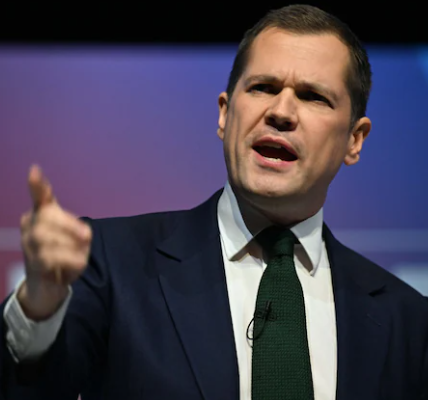Angela Rayner’s controversial planning reforms could see more than 2million homes built on the green belt – as critics to warn changes will trigger ‘urban sprawl’_Nhy
Angela Rayner will today unveil controversial planning reforms which could clear the way for developers to build more than two million new homes on the green belt.
The Deputy Prime Minister will vow to rip up the ‘broken’ planning system, saying it ‘caves in to the blockers and obstructs the builders’.
She will unveil new rules that could see hundreds of thousands of acres of green belt land redesignated as low-value ‘grey belt’ land, allowing it to be developed.
One expert claimed the changes could free up space for 2.5 million homes, leading critics to warn that the changes will trigger a new wave of ‘urban sprawl’ – which the green belt was designed to prevent.
Today’s plans will also impose mandatory housing targets on local authorities across the country, despite councils labelling them as unachievable. The move reverses the last Tory government’s decision to drop targets after deciding they were counterproductive. Councillors on planning committees will be stripped of the right to block individual developments if they conform to planning guidelines.
Ministers will also gain new powers to bypass the normal planning process on key infrastructure – such as prisons and the electricity pylons that link new wind and solar farms to the grid.
Today’s package will provide £100 million to councils to help them update their plans and assess which areas of their local green belt should be released for development.
Ms Rayner last night said the reforms were needed to boost growth and hit Labour’s target of building 1.5 million new homes over the next five years, and that ministers were ready to ‘do what it takes’ to fix the housing crisis.

The Deputy Prime Minister Angela Rayner will vow to rip up the ‘broken’ planning system, saying it ‘caves in to the blockers and obstructs the builders’

One expert claimed the changes could free up space for 2.5 million homes, leading critics to warn that the changes will trigger a new wave of ‘urban sprawl’

Labour leader Sir Keir Starmer and Ms Rayner during a visit to a housing development in the Nightingale Quarter of Derby
‘We cannot shirk responsibility and leave more than a million families on housing waiting lists and a generation locked out of home ownership,’ she said.
‘This landmark overhaul will sweep away last year’s damaging changes and shake-up a broken planning system which caves into the blockers and obstructs the builders.’
Labour’s manifesto pledged to introduce a new grey belt category for development on low-quality green belt sites, including former petrol stations and car parks.
But a draft definition that slipped out in the summer could open the door to an unprecedented assault on green belt land. Under the proposals – which are expected to be confirmed today with only minor changes – councils which fail to earmark enough sites to meet government targets will no longer be able to block green belt development on the basis of it being inappropriate.
An analysis of the draft definition by consultancy firm LandTech found it could force councils to release up to 375,000 acres of green belt land – equal to roughly one-tenth of the total area nationwide.
The firm said this could provide sites for up to 2.5 million new homes – or potentially as many as four million if ministers agree to let developers use sites more densely. Head of research Harry Quartermain told the Mail that unless they can achieve a ‘massive uptick’ in housing development, many councils will find ‘their green belt is up for grabs’.
He added that councils would either have to release more green belt land themselves or face a wave of ‘speculative’ applications which would be difficult to block.
Separate analysis by Lichfields suggested more than half-a-million acres of green belt land could be subject to development – an area larger than Surrey.

Labour’s manifesto pledged to introduce a new grey belt category for development on low-quality green belt sites, including former petrol stations and car parks

Ms Rayner last night said the reforms were needed to boost growth and hit Labour ’s target of building 1.5 million new homes over the next five years, and that ministers were ready to ‘do what it takes’ to fix the housing crisis
Rosie Pearson, of the Community Planning Alliance, said the proposals would lead to ‘random’ developments ‘in the middle of the green belt’.
She added: ‘It’s going to be the worst urban sprawl we’ve seen since the 1950s. It could be any countryside near you that’s at risk.’
But Government sources insisted they would take a ‘common-sense’ approach to the green belt. An insider added that the most precious green belt sites would retain their protections. A new series of ‘golden rules’ will require developers to provide the infrastructure needed for new communities.
Under today’s proposals, councils will have to produce local plans designating enough land to meet the Government’s targets. Some parts of England face a seven-fold increase in new housing due to the changes. Local authorities will have just three months to complete the local plans.

